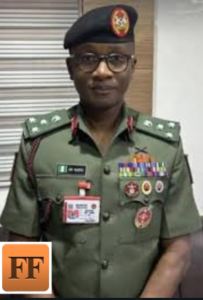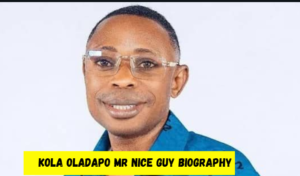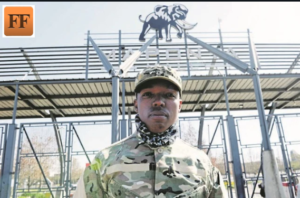
Zandile Dabula is a prominent and polarizing figure in South Africa’s contemporary civic and political scene. Best known as the president of Operation Dudula — a grassroots movement that pushed for tougher policing of undocumented migrants and prioritising jobs for South Africans — Dabula’s rise from relative obscurity to national attention has prompted intense public debate. Supporters view her as a defender of community jobs and services; critics accuse the movement she leads of fomenting xenophobia and vigilante tactics. Recent legal and political developments have intensified scrutiny of Dabula and Operation Dudula.
Let’s get down to the biography of Zandile in detail
Zandile Dabula Biography
| Item | Detail |
|---|---|
| Full name | Zandile Dabula (publicly used name) |
| Origin | Zimbabwe (Amandebele/Ndebele community) |
| Approximate birth year | Circa 1987–1988 (age ~37–38 in 2025) |
| Parents | Not publicly disclosed |
| Marital status | Married (spouse name not publicly disclosed) |
| Children | Two (names not publicly disclosed) |
| Profession / background | Human resources / community activism |
| Role | President, Operation Dudula |
| Reported net worth | Unverified estimate (circa USD $5k) — not independently confirmed |
| Public controversies | Accused by critics of xenophobic tactics; EFF opened a murder case involving Operation Dudula (Sept 2025). |
Early life and origin
Public records and press profiles consistently identify Zandile Dabula’s roots as being linked to Zimbabwe. Multiple reports say she belongs to the Ndebele (Amandebele) community and that she was born in Zimbabwe before moving to South Africa. Exact details about her childhood, schooling and parents are scarce in the public domain — Dabula and her inner circle have largely kept personal family information private. What is available paints the picture of someone who entered community activism after working in more conventional jobs, including roles in human resources.
Origin: Zimbabwe (Amandebele community).
Parents: Not publicly disclosed.
Age and background
Most news profiles place Dabula’s birth around the late 1980s; commonly cited approximations put her birth year near 1987–1988. That would make her about 36–38 years old as of 2025. Before becoming the public face of Operation Dudula she worked in HR-related fields and was active in local community organizing — experiences that helped her move into a leadership role once Operation Dudula expanded from township-level actions to national prominence.
How she rose to prominence — Operation Dudula
Operation Dudula began in 2021 in Soweto as local neighbourhood actions that aimed to push back on what members saw as illegal trading, hijacked buildings and an unregulated influx of traders and migrants they blamed for local economic hardship. The group’s name—“Dudula”—roughly means “push out” or “knock down” in isiZulu; over time the movement went from local patrols and shop checks to larger public marches and high-profile campaigns across multiple provinces. Dabula rose through the movement and by mid-2023 she was picked as the national president, a role that brought her sustained media attention and criticism alike. Under her leadership the movement increased its public profile and, at times, registered as a political entity in certain jurisdictions.
Personal life — husband, children and private details
Dabula is known to be married; media reports say she has two children. Some reports reference the children’s father as having Zimbabwean roots as well. Beyond confirming that she is married and a mother, Dabula’s camp has kept many family details private — including the names of her spouse and parents — and that privacy has been respected by many mainstream outlets. Where personal detail is missing, media pieces and background profiles usually note that the subject prefers to keep family life out of the spotlight.
Education and qualifications
Official records of Dabula’s academic qualifications are not widely publicised. Several profiles suggest she has at least some tertiary education and a background compatible with human-resources work, but no consistent university or degree citation appears across the major outlets. As with many active grassroots leaders, formal credentials are often less emphasised in public reporting than leadership activities and public statements
Net worth
$5,000
Controversies and legal issues
Operation Dudula’s methods and rhetoric have attracted strong criticism from civil-society groups, immigrant-rights organisations and some political parties. Critics argue that the movement has at times engaged in intimidation, targeted foreign nationals unfairly and impeded access to services. Supporters counter that Dudula focuses on law and order, fighting illegal trading and protecting scarce jobs for locals.
In September 2025, the Economic Freedom Fighters (EFF) in Gauteng opened a murder case at the Alexandra Police Station against Operation Dudula and its leader, Zandile Dabula. The case relates to allegations that a mother and her child were denied access to care at a clinic and that the child later died; the EFF alleges culpability by Dudula activists and has asked police to investigate. Operation Dudula has denied some of the claims and described parts of the narrative as politicised — but the legal complaint is a major escalation and is being handled by police and, potentially, prosecutors. Journalists covering the story emphasise that the criminal case is an allegation that will need to be proven in court.
How different groups view Dabula
-
Supporters: Many township residents and supporters who feel left behind by unemployment and poor service delivery see Dabula as giving voice to their frustration. They credit Operation Dudula with drawing attention to issues such as hijacked buildings, illegal trading and municipal service delivery failures
-
Critics: Human-rights groups, migrant-rights organisations and several political figures accuse Operation Dudula of vigilante tactics and stirring xenophobia. Litigation and public protests against some of Dudula’s tactics have already reached the courts and civic forums.
FAQs (Frequently Asked Questions)
Q: Who is Zandile Dabula?
A: Zandile Dabula is the national leader (president) of Operation Dudula, a controversial grassroots movement in South Africa that campaigns against undocumented immigration and illegal trading
Q: Where is Zandile Dabula from?
A: Media profiles commonly report that Dabula has origins in Zimbabwe and belongs to the Ndebele (Amandebele) community. Exact birthplace details are not widely published.
Q: How old is she?
A: Public reporting places her birth around 1987–1988, making her about 36–38 years old in 2025.
Q: Is she married and does she have children?
A: Yes — she is reported to be married and to have two children. The names of her spouse and children have not been broadly publicised.
Q: Has she been charged with a crime?
A: As of September 2025, the EFF laid a murder charge at a police station against Operation Dudula and named its leader in the complaint; that is an allegation under investigation by police and would need to proceed through the legal system. Operation Dudula has refuted parts of the claims.
Q: What is her net worth?
A: 5K USD
Conclusion
Zandile Dabula is a consequential and contentious public leader whose activism captured national attention as Operation Dudula moved from local neighbourhood actions to national campaigning. Whether one views her as a necessary voice for distressed South Africans or as a figure associated with divisive and dangerous tactics depends heavily on political perspective and values. What is clear is that Dabula’s profile has brought migration, jobs and municipal service issues into sharp public debate — and recent legal actions have ensured she will remain in the headlines as investigations proceed. For anyone writing about or researching Dabula, it’s important to distinguish between verified facts, reported claims and social-media speculation — and to cite reputable sources when making definitive statements





